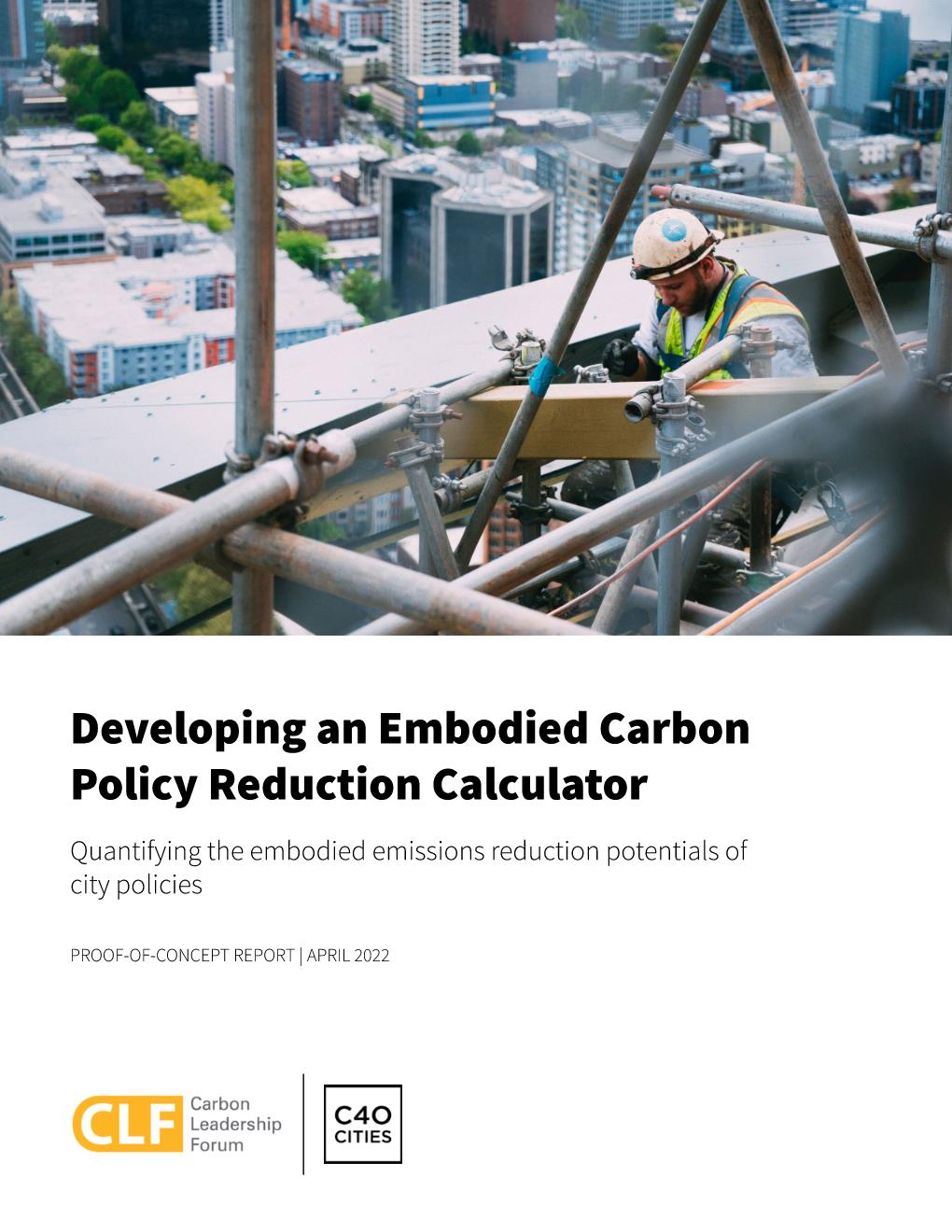The Developing an Embodied Carbon Policy Reduction Calculator report summarizes findings from the development of a proof-of-concept calculator and pilot study focused on estimating the carbon savings potentials of city-wide embodied carbon policies.
About
A growing number of cities are committed to tackling the urgent challenge of their built environment carbon footprint through their policies and programs. 110 cities took the Cities Race to Zero Clean Construction pledges to reduce embodied emissions in their policies and programmes in 2021, and 40 leading cities are participating in the C40 Clean Construction programme and mayors are setting the direction of travel by signing the Clean Construction Declaration, which requires collective action to halve embodied emissions by 2030.
However, embodied carbon is a new policy area for many cities and the lack of city-level data on embodied carbon is a significant barrier for policymakers to gain political support and make informed decisions. The goal of developing an embodied carbon policy reduction calculator is to address these challenges by:
- Modeling the potential embodied carbon reduction of a selected number of policies to give cities the values they need to make informed decisions;
- Allowing for comparison of emissions reduction policies for embodied carbon by key target dates (2030 and 2050) to assess the largest opportunities for impact;
- Evaluating which policies may be required to meet embodied carbon reduction targets, such as those set by city or regional climate action plans; and
- Ultimately enabling cities to make the case for and adopt policies to reduce embodied carbon.
Proof-of-Concept Study
The Carbon Leadership Forum and C40 Clean Construction teams collaborated in 2021 to develop a proof-of-concept for an embodied carbon policy reduction calculator, described in this report. The goal of this study was to:
- Assess the availability of city data and life cycle assessment data required to develop a successful tool;
- Assess tool scope and functionality required to support cities’ needs; and
- Demonstrate the tool concept to pilot cities to determine if it would be useful in policymaking.
The team developed four prototype calculators to estimate emissions from four types of embodied carbon policies using urban growth projections (floor area, building type, etc.) to 2050. The calculators provide a baseline estimate of embodied carbon emissions by 2050 alongside the carbon savings potentials of the selected reduction targets and policies.
The calculators described in this report are proof-of-concept: they are still limited in their ability for comparative decision-making at this time due to the gaps in data identified through this initial phase. Appendix B lists the priorities identified by the authors, contributors, and pilot cities necessary for their future development.
Case Studies
The team worked with New York City, Portland, and Austin (focusing on the South Central Waterfront neighborhood) to assess the total embodied carbon by 2050 for a baseline scenario and 3-6 reduction scenarios that correlated with the evaluated policy type.
Overall, policies requiring reductions in whole building embodied carbon were found to have the largest impact. The second-most impactful policy type based on the findings from the prototype calculators was incentivizing adaptive reuse, followed by low-carbon concrete and housing size policies. These findings highlight the need for better research and benchmarks on the whole buildings of different building typologies to support more robust estimates of total carbon savings potentials associated with each, but also to enable cities to pass these policies.
The initial results from this proof-of-concept study and feedback from cities indicate that these calculators could be a powerful resource for enabling policymakers to use the carbon savings potential estimates to develop and advocate for the policy solutions that are right for their cities and achieve their cities’ goals.
Authors
The research team from the Carbon Leadership Forum at the University of Washington College of Built Environments:
- Brad Benke, Researcher, Carbon Leadership Forum
- Meghan Lewis, Senior Researcher, Carbon Leadership Forum
- Stephanie Carlisle, Senior Researcher, Carbon Leadership Forum
- Monica Huang, Researcher, Carbon Leadership Forum
- Kate Simonen, Executive Director, Carbon Leadership Forum
Author contributions: M.L., S.C., and K.S. led conceptualization; B.B., M.L., and S.C. conducted research and analysis; B.B. created the calculators; B.B., M.L., S.C., M.H., and K.S. performed review and editing; B.B. created the graphics; B.B. and M.L. wrote the paper.
Contributors
This project would not have been possible without the contributions of the C40 Clean Construction Team:
- Cecile Faraud, Programme Manager, Clean Construction
- Andre Aasrud, Senior Advisor, Clean Construction
- Tessa Devreese, Programme Officer, Clean Construction
Acknowledgments
This study was commissioned by and co-developed with C40, thanks to the support of the City of Oslo and Ingka Retail (Ingka Group). The work is independent and has not been commissioned by any business, government, or other institutions. We would like to thank the following individuals from the pilot cities for contributing their time and feedback:
- Ross MacWhinney and Julia Casagrande with the New York City Mayor’s Office of Climate and Environmental Justice;
- Kyle Diesner and Shawn Wood with the City of Portland;
- Phoebe Romero, Marc Coudert, and Phillip Duran with the City of Austin; and
- Sarah Talkington, Greg Arcangelie, and Martin Torres with Austin Energy Green Building.
We would like to thank EskewDumezRipple (EDR), GGLO, Kieran Timberlake, LMN Architects, Miller Hull, and Mithun for contributing LCA reference models and time to provide the collection of reference models that informed our research.
Copyright
Developing an Embodied Carbon Policy Reduction Calculator is licensed under a Creative Commons Attribution 3.0 International License.
Cover image from Unsplash by Anthony Fomin. https://unsplash.com/photos/sTw2KYpoujk
Additional photos provided by C40.
Citation
Benke, B., Lewis, M., Carlisle, S., Huang, M., and Simonen, K. (2022). Developing an Embodied Carbon Policy Reduction Calculator. Carbon Leadership Forum, University of Washington. Seattle, WA. https://hdl.handle.net/1773/48566
